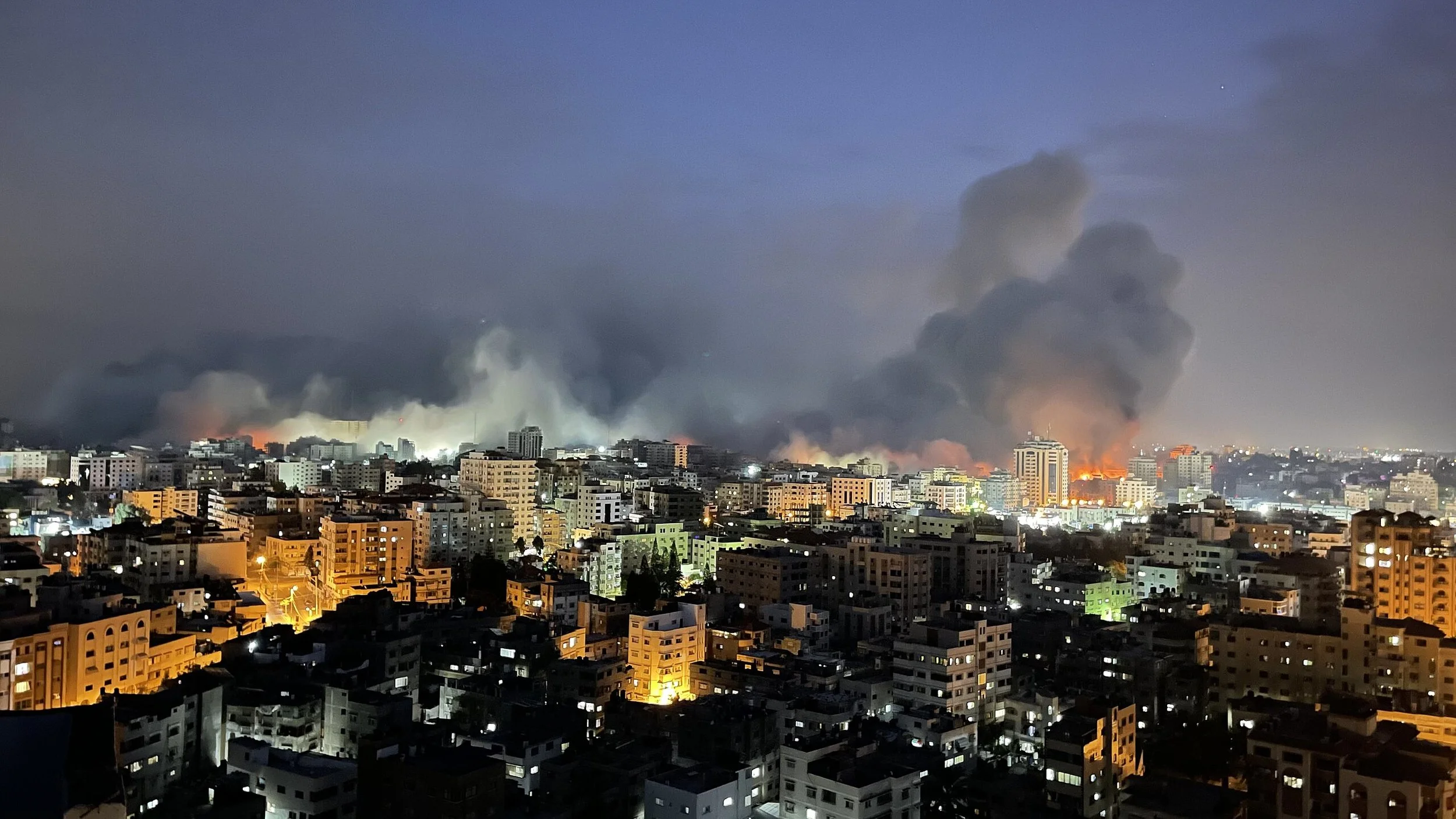Lack of prophetic voice on Gaza by Protestants repeats Pope’s silence during Holocaust
Israeli air strikes pummeling Gaza. Photo: Jaber Jehad Badwan via Wikimedia Commons.
The more I study the Church during World War II, the more I’m unsettled. Not just by the past, but by how familiar it feels today.
What more could the Vatican have done in the face of genocide across Europe? Lately, another question hits closer to home. What more could the Church—our churches, mainline Protestant churches—be doing now?
We live in a world where children are again dying from bombs, where food is again being withheld as a weapon, where entire populations are being displaced and demonized.
And once again, the Church is struggling to find its voice.
Learning the wrong lessons
In the 1940s, Pope Pius XII remained largely silent as Jews were rounded up and murdered across Europe. He spoke in vague terms about “those persecuted for their nationality or race,” but never named the evil outright.
The Vatican saved lives quietly, behind the scenes. But its institutional caution drowned out any clear prophetic stand.
That failure has haunted generations. And yet, I fear we’ve learned the wrong lesson. Not that the Church should have spoken louder, clearer, and sooner, but that silence, vagueness, and caution were somehow wise.
Today, those instincts are alive and well.
Gaza, Ukraine, and the cost of careful words
As Gaza bleeds and Ukraine suffers, I see the same careful diplomacy and slow-footed statements.
Pope Francis has shown more moral courage than his wartime predecessor. He has called the bombings in Gaza “cruelty, not war.” He has called for a humanitarian ceasefire and accused those who cut off food and water of fueling genocide. He called the Holy Family parish in Gaza every night.
That is real.
That is pastoral.
That is powerful.
His successor, Pope Leo XIV, has added to that moral clarity.
Pope Leo XIV said, “There is no Christian justification for war against children. Whether in Gaza or Ukraine, when the powerful destroy homes and hospitals, or blockade food and medicine, they act against the Gospel.”
He demanded unrestricted humanitarian access to all war zones and reminded world leaders that neutrality in the face of atrocity is itself a moral failure.
But despite these words, the structure of the Church, its institutional DNA,
seems to pull everything back toward caution. Every strong papal statement is followed by back-channel meetings, clarifications, and subtle retreats. Even moral truth gets filtered through diplomatic caution. And that pattern feels all too familiar.
And then there’s my church
I wish I could say the Presbyterian Church (USA) was different. I wish I could say my own denomination had stepped into this moment with the moral fire the Gospel demands.
But instead, I feel like we’ve chosen safety over truth again.
When Trumpism rose, full of racism, authoritarianism, and religious nationalism, our response was often tepid.
We held listening sessions.
We published balanced position papers.
But we didn’t draw clear moral lines.
We didn’t challenge the base instincts of white evangelical power or call out Christian complicity in cruelty.
And now, in the face of Gaza, starving children, hospitals bombed, journalists killed, aid blocked, we’ve struggled once again to speak clearly.
Our statements are often qualified to the point of uselessness. We want to show compassion without assigning blame, to express concern without offending donors, to balance justice and “both sides” like we’re navigating a church budget instead of a human catastrophe.
When Palestinians are described as “collateral damage” and U.S. policy enables their suffering, where is our righteous anger?
When Israeli hostages are weaponized for war, where is our heartbreak for them, too?
We are so scared of saying the wrong thing that we end up saying nothing that matters.
I’ve read PCUSA statements on Gaza that sound like they were written by committee members afraid of their inbox.
I’ve heard church leaders respond to genocide with little more than a shrug of Christian “complexity.”
We’re so busy trying not to be divisive, we’ve forgotten how to be prophetic.
And yes, I know it’s complicated.
Yes, I know the Church has donors on both sides of the issue.
Yes, I know pastors are exhausted.
But none of that excuses cowardice. Not when children are dying. Not when entire communities are being erased.
What the Church is supposed to be
This isn’t about Catholic or Presbyterian. It’s about whether the Church is going to be what it claims to be:
A moral voice when others fall silent.
Salt and light.
A refuge for the vulnerable.
A thorn in the side of empire.
Whether in 1943 or 2025, the Church cannot claim to stand with Jesus while staying silent before systems of violence.
Jesus didn’t balance statements. He flipped tables.
And I say all this because I love the Church. I stay in it because I believe it still has the power to speak truth to power. But only if we choose to.
The Church’s job, always, should be to risk its comfort, its reputation, its wealth, its safety, for the sake of truth and justice and love.
That’s what it means to follow Christ.
That’s what it means to matter.
And God help us, because if we can’t do that now, if we can’t speak with clarity when the world is once again on fire, then what are we even doing?

